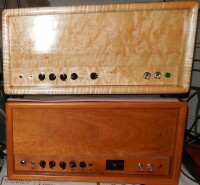Last edited by PeterCapo on Mon Nov 30, 2020 8:34 pm; edited 1 time in total
+6
deepee99
HarryY
Bob Latino
Roy Mottram
cci1492
LeGrace
10 posters
Resistor Type and One Other Question

Guest- Guest
- Post n°26
 Re: Resistor Type and One Other Question
Re: Resistor Type and One Other Question
.
Last edited by PeterCapo on Mon Nov 30, 2020 8:34 pm; edited 1 time in total

gktamps- Posts : 34
Join date : 2017-07-30
Location : Santa Rosa, CA
- Post n°27
 Re: Resistor Type and One Other Question
Re: Resistor Type and One Other Question
I have long found the info at www.resistorguide.com to be helpful - check the links Peter W. provided.
Haven't read this document thoroughly, but it provides a table for baking resistors.
http://www.rcdcomponents.com/rcd/technical.htm
Click on Resistor FAQ's.
Other info on baking I've found online have been anecdotal without much in the way of references to testing.
Haven't read this document thoroughly, but it provides a table for baking resistors.
http://www.rcdcomponents.com/rcd/technical.htm
Click on Resistor FAQ's.
Other info on baking I've found online have been anecdotal without much in the way of references to testing.

Guest- Guest
- Post n°28
 Re: Resistor Type and One Other Question
Re: Resistor Type and One Other Question
.
Last edited by PeterCapo on Mon Nov 30, 2020 8:33 pm; edited 1 time in total

Bob Latino- Admin
- Posts : 3277
Join date : 2008-11-26
Location : Massachusetts
- Post n°29
 Re: Resistor Type and One Other Question
Re: Resistor Type and One Other Question
PeterCapo wrote:Again, I don't dispute the technical differences between different resistor types, as would be manifest and quantified in an R&D laboratory, for instance. Numbers don't lie - not even with carbon comp resistors. Meaning, it's worth remembering that classic audio gear originally achieved very good distortion and frequency response figures using carbon comps, for example.
This is quite true but some carbon composition resistors from the "vintage days" were found after many years to sometimes drift in their value (usually upward). If you have two channels on an amp, it is possible after many years that some of the resistors don't match very well from channel to channel. Older carbon composition can sometimes absorb moisture.
Check out the Google link below about carbon composition resistor value drift.
Carbon composition resistor value drift
Bob

Guest- Guest
- Post n°30
 Re: Resistor Type and One Other Question
Re: Resistor Type and One Other Question
.
Last edited by PeterCapo on Mon Nov 30, 2020 8:33 pm; edited 1 time in total

HiGHFLYiN9- Posts : 8
Join date : 2011-08-17
Location : East Coast
- Post n°31
 Re: Resistor Type and One Other Question
Re: Resistor Type and One Other Question
I feel like the most important part of the thread is being glossed over. Having resistors burn out is a safety issue and it means there is something amiss with the circuit, potentially the wiring is incorrect, or the value of the parts used do not have enough headroom. It could have something to do with a solid state rectifier putting more stress on the circuit if you are using one. I recommend gathering some values with your multimeter (using proper safety precautions) and share them with Bob/Tubes4HiFi to ensure everything is working at the proper spec. Using a variac is a good safety precaution as others have mentioned. Bob may recommend using higher wattage resistors as a precaution.
As far as resistor types, everyone has theirreligion opinion, which is perfectly fine. Most carbon comps drift over the decades (very significantly as I've measured in 60s era gear), but many people (including venerable audio engineers like Pete Millett) use them as grid resistors. They are noisy and technically not good in the signal path, but they have a sweet/warm sound. If you can afford tantalum resistors in the signal path, they are widely considered the best. At $4 to $10 each, it's a bit much for most people. I personally like carbon film for signal and vishay metal film for everything else. For wirewound, Mills non-inductive generally sounds better in audio circuits than something like like metal oxide or sandcast. If you're not particular, you can use vishay metal film for just about everything and it'll work well.
Best thing to do is just experiment with different resistor types and come up with your own opinion
As far as resistor types, everyone has their
Best thing to do is just experiment with different resistor types and come up with your own opinion

Guest- Guest
- Post n°32
 Re: Resistor Type and One Other Question
Re: Resistor Type and One Other Question
.
Last edited by PeterCapo on Mon Nov 30, 2020 8:32 pm; edited 1 time in total

Bob Latino- Admin
- Posts : 3277
Join date : 2008-11-26
Location : Massachusetts
- Post n°33
 Re: Resistor Type and One Other Question
Re: Resistor Type and One Other Question
Check out the Youtube video below on carbon composition resistors. They probably could be used in some high voltage applications but IMHO, they have no place in tube audio where tolerances have to be kept close.
Bob
Bob

1973shovel- Posts : 45
Join date : 2009-12-13
- Post n°34
 Re: Resistor Type and One Other Question
Re: Resistor Type and One Other Question
PeterCapo wrote:I remember seeing bake-out procedures in a couple of places online, but I cannot remember where. Do you know where to find them?
Here's where I posted the carbon composition resistor baking procedure, taken from an old Allen-Bradley data sheet. (If anyone wants the complete A-B data sheet, feel free to email me). Moisture seems to be the culprit, so I store in-tolerance carbon comps in small, lidded containers, with a small desiccant pack, like the ones which come inserted in a bottle of vitamins, for example.
https://db.audioasylum.com/mhtml/m.html?forum=tubediy&n=265947&highlight=bake+1973shovel&search_url=%2Fcgi%2Fsearch.mpl
As to the usefulness of carbon comp resistors, I'm in agreement with Pete Millett, Eli Duttman, PeterCapo, and peterh, with his following quote:
carbon comp resistors are non inductive, thus they keep their properties way up in frequency. That's why they are the best for grid and screen stoppers. And as such they do not add noise and their exact values are of no concern. wrote:
The "sound" of different types of resistors aside, carbon comps are the optimum choice for stopper positions, and as peterh also noted, their exact value isn't critical. Start with them in tolerance, and even if they do drift over the years, your electrolytic caps are probably shot by that time anyway, so check and replace (if necessary) the carbon comp stopper resistors when you're replacing the caps. Simple enough.

Guest- Guest
- Post n°35
 Re: Resistor Type and One Other Question
Re: Resistor Type and One Other Question
.
Last edited by PeterCapo on Mon Nov 30, 2020 8:32 pm; edited 1 time in total

1973shovel- Posts : 45
Join date : 2009-12-13
- Post n°36
 Re: Resistor Type and One Other Question
Re: Resistor Type and One Other Question
I just finished watching the video where he shows carbon films and metal films have an increase in inductance over the carbon comps. He says "You're probably going to be using chip resistors, so you wouldn't have to worry about it". We know we're not using chip resistors in our tube amps.
I also found it rather ironic that the guy's name is "The Radio Mechanic", yet he never mentions that it's wrong to indiscriminately swap out carbon comps for metal films (for example) in RF circuits, if they were originally built using carbon comps. More than a few Dynaco FM-3s have been screwed up by these substitutions. One article I have on parts substitution says, "Pure carbon composition resistors decrease in value much faster than film types in RF circuits, therefore if you replace carbon composition with a film type, in some RF circuitry , there may be a change in circuit operation." If you find an old tube radio, for example, don't just change all the resistors in the RF sections to carbon film or metal film if it was originally designed with carbon composition resistors. The engineers knew the characteristics of carbon comps in an RF (radio frequency) circuit and took that into account when they designed it.
I happily use carbon film and metal film resistors in my amps, except in the grid and screen stopper positions, where I insist on carbon composition.
I also found it rather ironic that the guy's name is "The Radio Mechanic", yet he never mentions that it's wrong to indiscriminately swap out carbon comps for metal films (for example) in RF circuits, if they were originally built using carbon comps. More than a few Dynaco FM-3s have been screwed up by these substitutions. One article I have on parts substitution says, "Pure carbon composition resistors decrease in value much faster than film types in RF circuits, therefore if you replace carbon composition with a film type, in some RF circuitry , there may be a change in circuit operation." If you find an old tube radio, for example, don't just change all the resistors in the RF sections to carbon film or metal film if it was originally designed with carbon composition resistors. The engineers knew the characteristics of carbon comps in an RF (radio frequency) circuit and took that into account when they designed it.
I happily use carbon film and metal film resistors in my amps, except in the grid and screen stopper positions, where I insist on carbon composition.

HarryY- Posts : 46
Join date : 2019-07-24
Location : NY
- Post n°37
 Re: Resistor Type and One Other Question
Re: Resistor Type and One Other Question
I have a whole bunch of unused carbon comp resistors.
I should gatherer them up and sell them on ebay.
I should gatherer them up and sell them on ebay.

cci1492- Posts : 331
Join date : 2016-05-09
Age : 64
Location : NJ
- Post n°38
 Re: Resistor Type and One Other Question
Re: Resistor Type and One Other Question
HarryY wrote:I have a whole bunch of unused carbon comp resistors.
I should gatherer them up and sell them on ebay.
bake'em first

deepee99- Posts : 2244
Join date : 2012-05-23
Location : Wallace, Idaho
- Post n°39
 Re: Resistor Type and One Other Question
Re: Resistor Type and One Other Question
And say these are of the rare, polarized one-directional design, and don't "blossom" until about 5K hours.cci1492 wrote:HarryY wrote:I have a whole bunch of unused carbon comp resistors.
I should gatherer them up and sell them on ebay.
bake'em first

HarryY- Posts : 46
Join date : 2019-07-24
Location : NY
- Post n°40
 Re: Resistor Type and One Other Question
Re: Resistor Type and One Other Question
deepee99 wrote:And say these are of the rare, polarized one-directional design, and don't "blossom" until about 5K hours.cci1492 wrote:HarryY wrote:I have a whole bunch of unused carbon comp resistors.
I should gatherer them up and sell them on ebay
bake'em first
Plus they have been stored in a temperature controlled environment.
I will occasionally use one in a test circuit if I don't have a better one on hand.
But mostly never used them due to their size.
